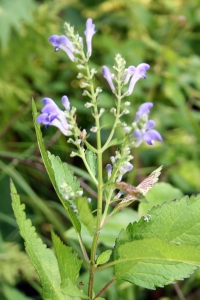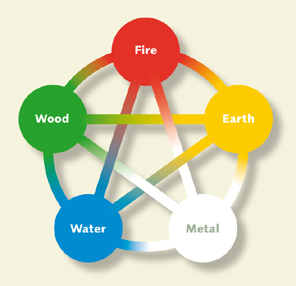
Skullcap, or Scullcap, tomato or tomatoe? Isn’t it interesting that this member of the mint family, which contains approximately 300 species, can be found spelled either way with a “c” or a “k?” Even the herb companies have taken sides. For example, Herb Pharm spells their product Skullcap, while Nature’s Way spells it Scullcap. Somewhat confusing, I know, when you also consider that spell check doesn’t like skullcap spelled with a c, i.e., “not found in dictionary.” No matter how you choose to spell skullcap, the plant I will be discussing as the integrator of consciousness is the botanical Scutellaria lateriflora.
The name skullcap derives from the Latin scutella meaning, a small dish and referring to the shape of the flower. Even though Chinese skullcap (Scutellaria baicalensis root) shows up in many formulas, I tend to use American skullcap (Scutellaria lateriflora) as a “simple.” What that means is that I like to use one herb at a time, when appropriate, because then I don’t have to wonder which herb is working or which one is not. With simples, if a person is worried about interactions between the pharmaceuticals they take and herbals, it makes the interactions simple to observe and simpler to avoid. Besides, you can only put so many herbs in your body at one time (like food). Adding too many together at the same time may dilute the potency and create a confusing smorgasbord for your body. I also believe that healing takes place in the context of relationships, and using one herb at a time allows for a deeper intimacy with that plant and helps build trust.

Because I live in the Appalachian Mountains of Western North Carolina, I am particularly interested in the plants that grow here. Skullcap is one of these and a North American native highly valued by the Cherokee people who use it as a nerve tonic and sedative. It likes to grow along the sunny edges of damp meadows near small bodies of water. As a perennial, it thrives in the moist eastern woodlands. Small pale blue or violet-blue flowers are not long-lived and bloom in the summer between June and September. These flowers are in one-sided racemes from leaf axils, which makes skullcap easier to identify. Tincture the aerial parts when fresh and in full bloom.
According to medical herbalist David Hoffman, skullcap is perhaps the most relevant nervine available to us in the Western materia medica. It soothes nervous tension while strengthening the central nervous system and has a long history of use for petit mal seizures, sleepwalking, night terrors, and insomnia. It also relieves nervous irritability, tension headaches, and PMS tension. Skullcap lessens the symptoms of drug and alcohol withdrawal. Herbalist Patricia Kyritsi Howell says that skullcap is a specific remedy for mental fatigue and nervous exhaustion caused by over-stimulation and the effects of long-term stress.
My encounters with skullcap have been most rewarding. Gathering it in and of itself is a blissful occupation. I have made and used fresh skullcap tinctures for both myself (nervous exhaustion) and with clients. One skullcap success story resulted when a mother brought her 9-year-old son to me for a consultation regarding his bedwetting. Let us call him Jimmy. Jimmy had been sleepwalking, bedwetting, and having night terrors for as long as his parents could remember. They had recently adopted a sister for Jimmy from China. Consumed with caring for this new family member who had special needs, they no longer wanted to be up in the middle of the night with Jimmy. Besides, they were genuinely frightened and concerned for his safety and wellbeing when they would find him walking around in the middle of the night completely asleep. Jimmy did not know what was happening and woke in the morning with no recall. He was also diagnosed in school with ADD. I recommended skullcap tincture in the morning and evening, along with some dietary changes (no wheat and dairy) with a one-month follow-up. At one month, I tried contacting the mother, but she never got back to me. A few months later, I ran into them at a social gathering and asked how Jimmy was doing.
“Oh, great!” She said and went on to tell me about all the exciting things they had been doing.
“Great!” I said, “ but what about the night terrors, sleepwalking, and bedwetting?”
“Oh!” She answered back, mildly surprised. “That is completely gone, and he’s had no problems with that since. I can’t thank you enough!”
What I realized was that she had simply gotten on with her life and not looked back. Then she told me that they had been unable to make any dietary changes but that Jimmy had started to improve almost immediately with the skullcap. I stood looking at her, amazed.
On another occasion, a friend of mine’s daughter called me and sounded frantic. Her 9-month old baby girl wasn’t sleeping and woke to cry hysterically every night and had a hard time getting back to sleep. That had been going on for three months. The mom felt like she had tried everything, including more food to settle the baby’s stomach if she might be hungry and different food. She tried chamomile tea, homeopathic remedies, ruled out teething, and had the baby checked by a pediatrician. Do you want to know what worked? Skullcap. She gave her daughter five drops of alcohol tincture up to 3 X a day. The beauty of skullcap is that it is a tonic that can be used long-term and is not addicting.

From the perspective of Traditional Chinese Medicine’s five-element theory, I learned that skullcap is a cooling, bitter herb, which calms the mind and restores the shen to the heart (Fire Element). In TCM, the mind refers to the heart. In this context, the shen corresponds to the mind and consciousness, with the process of thinking accomplished by the heart. One of the hearts main duties is to store the shen, which describes spirit or the animating force of life. The word shen translated from the Chinese means both “mind” and “spirit.” As the integrator of consciousness and perception, the shen unites the disparate aspects of the self. When the shen is restless for any reason, as we have seen in the examples above, skullcap has the amazing ability to restore the shen. We may call this restlessness “nervous anxiety” or “nervous tension,” but the nervous system is what carries the electrical impulses generated by the brain and heart. Heart-Mind in TCM corresponds with the Fire Element and the Summer season. The benefits of Skullcap to reduce nervousness and treat insomnia by quieting the spirit or shen and helping it to stay centered in the heart cannot be over-estimated. Summer is the perfect time to be introduced to skullcap in her season of bloom So I invite you to bring her into your life in whatever manner you may choose and get to know her, for her gift is great.
When the heart is serene, pain seems negligible.
– Inner Classic
Fresh Tincture Dosage: 30 drops (1 dropper full) 1:2 (75A:25W) 2-3 x a day
Can also be tinctured fresh using Vodka in the folk tradition.
References:
Making Plant Medicine, Richo Cech, Horizon Herbs
Medical Herbalism: The Science and Practice of Herbal Medicine, David Hoffmann, Healing Arts Press
Medicinal Plants of the Southern Appalachians, Patricia Kyritsi Howell, Botanologos Books
The Cherokee Herbal: Native Plant Medicine from the Four Directions, J.T. Garrett, Bear & Co
Learn more strategies for harmonizing the Fire Element in Thea’s work-at-your-own pace online class Heal Your Heart: Nervous System Health & the Fire Element at Five Element Academy.
Thea, enjoyed your post. The skullcap is just beginning to flower here at RavenCroft. Green blessings your way, EagleSong
On Mon, Aug 2, 2021 at 3:34 PM Wisdom of the Plant Devas wrote:
> Thea Summer Deer posted: ” Scutellaria lateriflora Skullcap, or Scullcap, > tomato or tomatoe? Isn’t it interesting that this member of the mint > family, which contains approximately 300 species, can be found spelled > either way with a “c” or a “k?” Even the herb companies have tak” >
LikeLiked by 1 person
Thank you EagleSong! She is such a beauty and gift of good medicine. Please share her with us and how she is helping you and yours.
LikeLike
Thank you for this! I’ve been growing 2 kinds of skullcap and wanting to know it more deeply. Appreciate I you sharing your wisdom and experience.
Sent from my iPhone (770)335-7292 http://www.sustenancedesign.com
>
LikeLiked by 1 person
Your ecological resilience website looks great. You might appreciate the Medicine Wheel Garden chapter of my book.
LikeLike